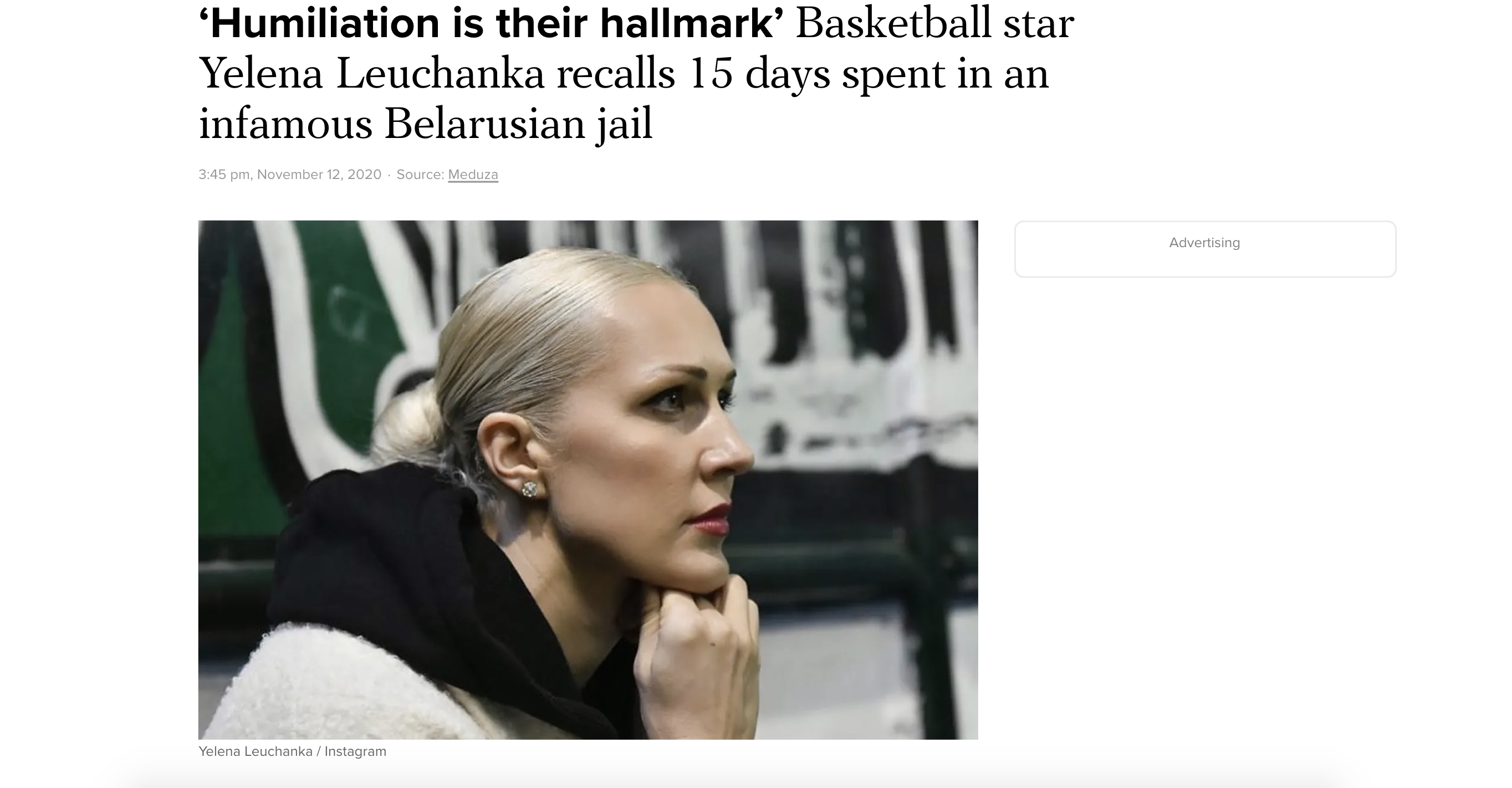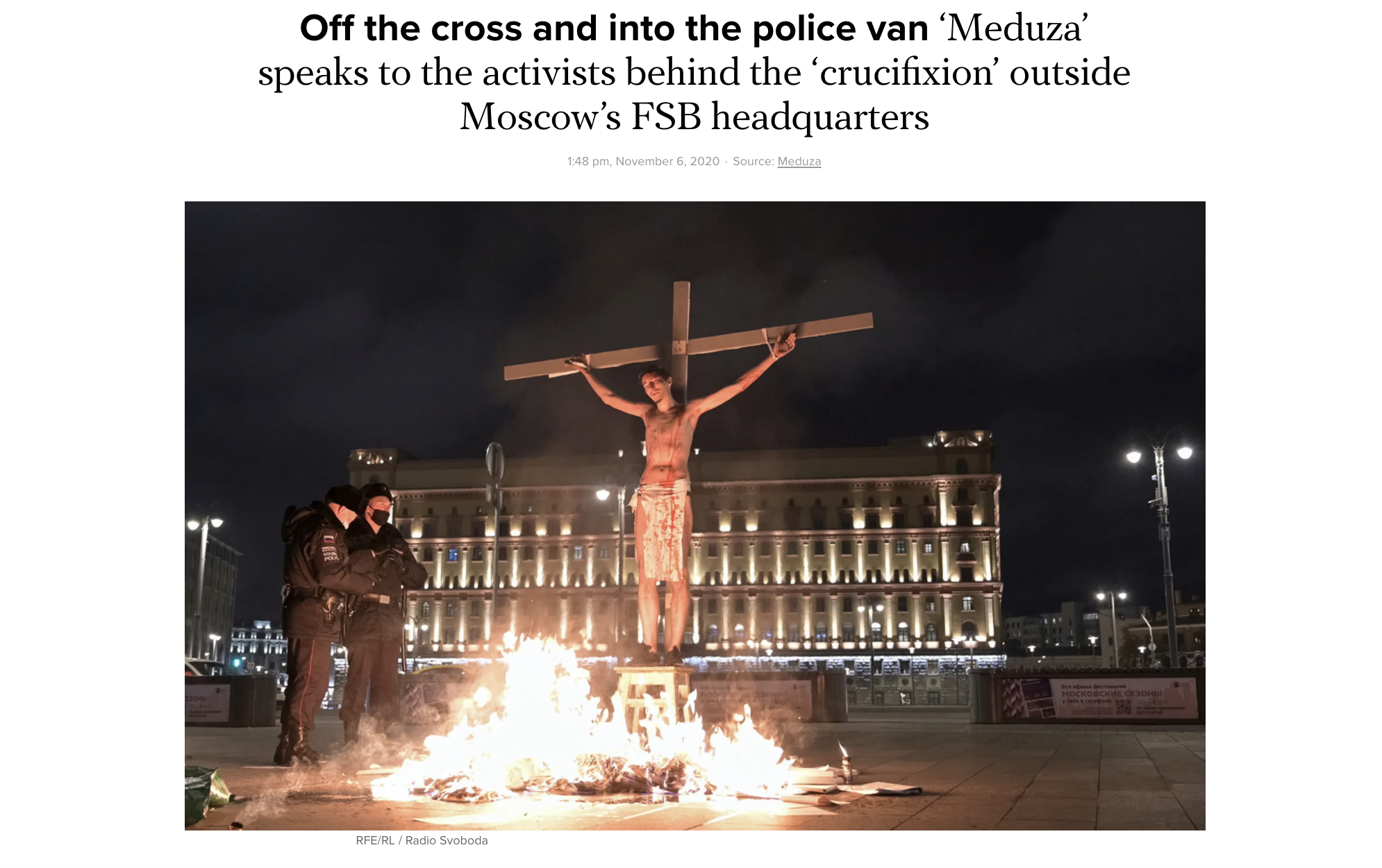Items
Tag
Civil Society
-
‘Humiliation is their hallmark’ Basketball star Yelena Leuchanka recalls 15 days spent in an infamous Belarusian jail
Yelena Leuchanka, a Belarusian basketball player, was recently arrested and kept in the Okrestina detention center for her participation in protests opposing the Lukashenko regime. Her story speaks to the broader human effects of the continuing protests in Belarus, as well as the ways that the state cultivates strong complicity amongst its constituents. -
Off the cross and into the police van - ‘Meduza’ speaks to the activists behind the ‘crucifixion’ outside Moscow’s FSB headquarters
On Thursday, November 5th, Pavel Krisevich, a Russian activist famous for his symbolic protests, performed a ‘mock crucifixion’ outside of Moscow’s FSB headquarters. His use of art combined with the motto “Down with the police state!” speaks to the ways in which the power dynamic between the police and the people in Russia maintains the authoritarianism that marks the region, as well as the potential for change towards liberal democracy. -
‘I will remember her ashes forever’ Why Nizhny Novgorod’s most independent journalist, Irina Slavina, burned herself alive in front of the local police station
The death of Irina Slavina, co-founder and editor-in-chief of the free journalism KozaPress, is the living evidence of media censorship and violation of free speech in Russia. -
‘It’s what society wants’ Belarusian bodybuilding champion divorces husband identified as riot policeman in infamous protest snapshot
A famous Belarusian body-builder recently divorced her husband, a member of the riot police of Minsk, after she received threats following the release of his personal information via a doxing service. Her declaration that her divorce "Is what society wanted" speaks to the growing effect of protests in the region on individuals, as well as whether threats to personal livelihood will grow increasingly relevant in convincing the authorities to enact positive change. -
‘You have no masks’ Meet the Belarusian developer working on a facial recognition algorithm for doxing riot police
In response to severe police suppression of protests in Belarus, developer Andrey Maximov designed a program that exposes the identities of police officers accused of abuse. While this is a positive evolution in terms of the Belarusian people's tactics of non-violent direct action, its efficacy will only be revealed by the nature of the response of the Lukashenko regime. -
Belarusians take to the streets in protest following Lukashenko’s ‘secret’ inauguration
Protests movements across Belarus gained traction once again last week, following the 'secret inauguration' of President Lukashenko despite the contested results of his election on August 9th. As pro-democracy movements are increasingly met with violent suppression in the country, the fate of the Belarusian people remains in question as they continue in the fight to shape their historical process and geo-political climate. -
‘This case is real’ Belarusian riot police are using sexual violence against protesters
Protests against the Lukashenko regime in Belarus have been met with increased violence by police authority following the contested elections of August 9th, as officers use similar techniques of brutality against civil dissent as those recently employed in Russia. As the fight for liberal democracy in the region continues, the media plays a distinct role in presenting the harm inflicted on protestors to the general population. -
Sorry we exist - The emergence, blossoming, and almost complete defeat of Russian drug activism
The history of drug activism in Russia following the fall of the Soviet Union is one of great significance and turmoil, spanning over twenty-two years and a variety of movements. While calls for the humanization and medical treatment of drug-users in Russia have been persistent, victims of the country's opioid epidemic are continually oppressed by law enforcement, as civil dissent is increasingly prohibited. As Russia's opioid epidemic worsens, and more individuals fall victim thereof, many aspects of the calls for change in the country are strikingly familiar to social justice movements globally.







